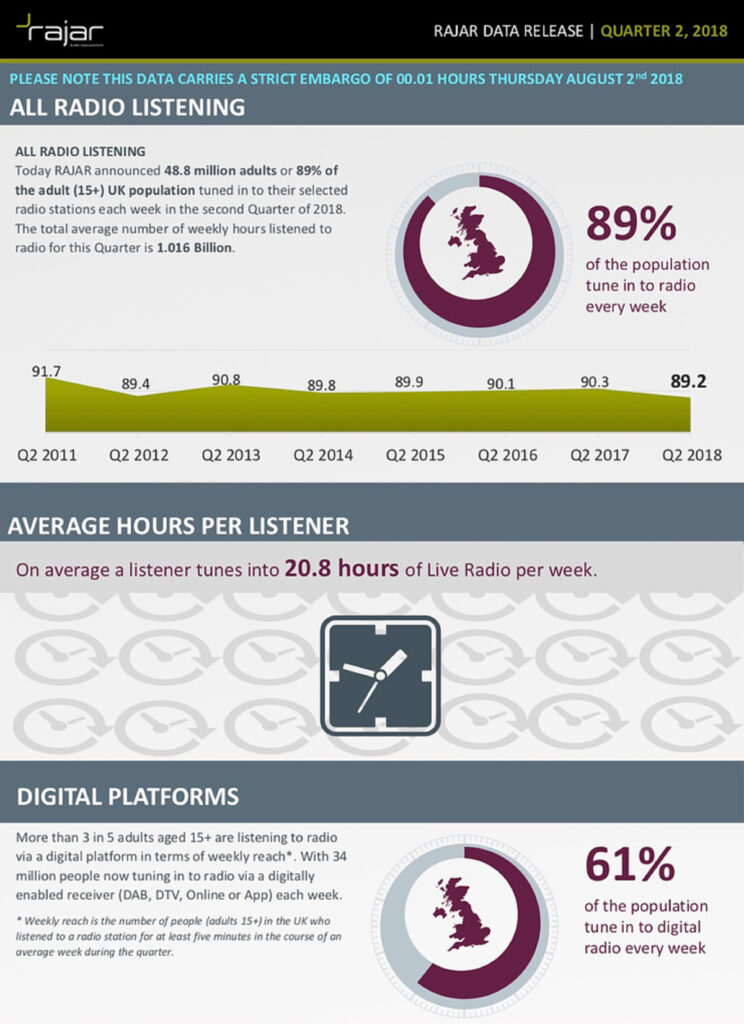How the turnaround success of BBC Radio 6 Music shows the power of targeting.

It’s been quite a year for me personally. First, I quit a big agency role. Second, M&S became my first retained client. Third, I enrolled on a mini-MBA in marketing led by the estimable Mark Ritson. And, lastly, I switched up my radio habits and started listening to (BBC Radio) 6 Music.
The result? (a) I’m loving the freedom and variety of consultancy work (b) the mini-MBA is proving more challenging and nourishing than I could have hoped for ; and (c), as for 6 Music– I’m like, how have I survived this long without it?
Seven years after it was due to close, 6 Music has posted another annual rise in listeners. The station which proudly positions itself as “For the music fans” now has 2.53m listeners and has overtaken BBC Radio 3 by some 600,000. Not bad for a station which was deemed to deliver “relatively few unique listeners to BBC radio” and that it wouldn’t be able to stand-out for 30-50 year olds, a “commercially valuable audience.”
How has 6 Music become a powerhouse within the branded house of the BBC? Simple, great marketing. Here’s how.
1. KNOW YOUR CUSTOMER
In the MBA, Ritson makes the distinction between the ideal orientation, market or customer orientation, and the three alternatives – product, advertising and sales. From the very first protest which saw over 100,000 people campaign to save the station from closure, Radio 6 was positioned as a station for music lovers. “Build it and they will come” springs to mind as does Seth Godin’s quote, “don’t find customers for your products, find products for your customers.”
2. NEW IDEAS TAKE TIME TO BED IN
In a seminal piece of research The Long and the Short of It, Les Binet and Peter Field explore how campaign results develop over time. Their focus on the tension that exists between short-term response activity and long-term brand building could have been written for 6 Music. At the launch of digital radio in 2002, the great re-building of radio seemed to falter to a stand-still. Where were the new audiences everyone had promised? Where were the new revenues? By 2008 the outlook was so bleak that Fru Hazlitt, former boss of Britain’s then-biggest commercial broadcaster, said that a digital future for radio was not “economically viable.” Fast-track to the latest numbers from RAJAR and 48.8 million adults consume over 1bn hours of radio each week and over 60% of the population tune in to digital radio every week.
Big ideas always need time to bed in but knowing when to kill an idea is just as important.

3. PINPOINTED SEGMENTATION
One of the great pain points of working within the marketing ecosystem is the number of times brands rely on hypothetical customers to make important decisions. Too often businesses want quick remedies, so they eschew primary research in favour of personal views, observations and tastes. It’s like when a client reviews a finely researched and honed creative and says, “I don’t like it”. The great marketer realises their own opinion doesn’t matter – it’s the voice of the customer that matters.
Segmentation is the cornerstone of market orientated marketing and 6 Music knew exactly who it would appeal to, where they were and what they were into. And given its continued growth, one could say it still does.
4. PERFECT TARGETING
Brands which use segmentations for targeting are missing a trick. Targeting is about your brand. Targeting is strategy. And, as Michael Porter said, “the essence of strategy is choosing what not to do.” 6 Music chooses, for the most part, not to play music that other stations play. It chooses not to appeal to mainstream tastes. It chooses not to do things because they might be popular, it chooses to do them because they believe them in. When outgoing breakfast show host Shaun Keavney was asked about hitting a new target of 2.5m listeners, he said “I don’t see any reason why not. But you have got to be careful. The moment you go too far in grasping for extra listeners you are losing the very essence of what people want. It’s a fine line.” That’s targeting.
5. SIMPLE BUT EFFECTIVE POSITIONING
As anyone who has worked on brand propositions or brand purpose will tell you, it can sometimes be a hellish experience. Too often it can become purpose by committee – more and more words have to be included to ensure all stakeholders are catered for. But a great positioning statement is clean, to the point, and describes how you want to differentiate your brand in the mind of your target customer.
BBC Radio 6 Music, as a brand, is a Ronseal – it does what it says on the tin, telling the world that this is a station dedicated to music. But it’s the brand positioning that brings to life its original intent:
“The service aims to appeal to music fans by focusing on acts “outside the mainstream”. It (will) also feature archive recordings of tracks from the 1960s onwards.”
BRAND POSITION: For the Music Fans
6. MEANINGFUL AND DIFFERENTIATED CONTENT WHICH DEEPLY RESONATES
As Radio 5 Live presenter, Richard Bacon, said:
“6 Music is staffed by talented people providing ‘distinctive’ programming that values ‘quality over quantity’.
My particular favourite is Lauren Laverne although The Huey Show and Gilles Peterson are up there too. The thread of steel is content designed to be true to the station and its positioning, therefore in line with what the customer wants. Surprise and delight tactics keep it fresh, but the customer is always front and centre of everyone’s thoughts.
So, there it is. Six steps to creating a stand-out brand in a branded house which is delivering year-on-year success.
As Louis Theroux said at last week’s Festival of Marketing, marketing is an “unacknowledged art form” but it’s Peter Drucker, who Ritson describes as the greatest managerial thinker of the 20thCentury, that best sums up not only how and why 6 Music has been so successful, but what all brands must do to succeed.
“Marketing is not only much broader than selling, it is not a specialised activity at all. It is the whole business seen from the point of view of its final result, that is, from the customer’s point of view.”






